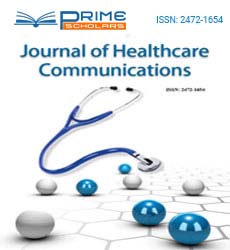Commentary Article - (2024) Volume 9, Issue 1
The Transformative Power of Healthcare Technology: A Gateway to Improved Wellness
Kim Lee*
Department of Preventive Medicine, Yonsei University, Republic of Korea
*Correspondence:
Kim Lee,
Department of Preventive Medicine, Yonsei University,
Republic of Korea,
Email:
Received: 29-Jan-2024, Manuscript No. IPJHCC-24-19120;
Editor assigned: 31-Jan-2024, Pre QC No. IPJHCC-24-19120 (PQ);
Reviewed: 14-Feb-2024, QC No. IPJHCC-24-19120;
Revised: 19-Feb-2024, Manuscript No. IPJHCC-24-19120 (R);
Published:
26-Feb-2024, DOI: 10.36846/2472-1654-9.1.9009
Description
In an era defined by technological advancements, perhaps
no sector has witnessed a more profound transformation
than healthcare. The integration of cutting-edge technology
has not only revolutionized medical practices but has also
paved the way for enhanced patient care and outcomes. From
diagnostics to treatment, healthcare technology has become
the cornerstone of modern medicine, offering unprecedented
opportunities for both healthcare professionals and patients
alike.
One of the most significant contributions of healthcare
technology lies in the realm of diagnostics. Gone are the days
when medical professionals relied solely on manual examinations
and intuition to diagnose illnesses. Today, advanced imaging
techniques such as MRI, CT scans, and ultrasound provide
detailed insights into the body's internal structures, enabling
more accurate and timely diagnoses. Moreover, the advent
of artificial intelligence (AI) has further augmented diagnostic
capabilities, allowing for the early detection of diseases and
personalized treatment plans tailored to individual patient
needs. Furthermore, healthcare technology has revolutionized
treatment modalities, offering innovative solutions that were
once deemed unimaginable. For instance, robotic-assisted
surgeries have transformed the field of surgery, allowing for
greater precision, reduced invasiveness, and faster recovery
times. Additionally, advancements in telemedicine have
bridged the gap between patients and healthcare providers,
especially in remote or underserved areas, by enabling
virtual consultations and remote monitoring of vital signs.
Such initiatives not only enhance access to healthcare but
also promote continuity of care, particularly during times of
crisis such as the ongoing COVID-19 pandemic. Moreover, the
proliferation of wearable devices and health monitoring apps
has empowered individuals to take charge of their own health
and well-being. From fitness trackers to smartwatches capable
of monitoring heart rate and sleep patterns, these technologies
provide users with real-time feedback on their health status,
encouraging preventive measures and lifestyle modifications.
Furthermore, the integration of data analytics allows for the
aggregation and analysis of vast amounts of health-related
data, enabling researchers to identify patterns, predict
disease outbreaks, and develop targeted interventions for
improved population health. However, despite the numerous
benefits offered by healthcare technology, it is crucial to
address the challenges and ethical considerations associated
with its implementation. Privacy and data security concerns
remain paramount, particularly concerning the collection
and sharing of sensitive health information. Moreover, the
digital divide continues to pose barriers to equitable access
to healthcare technology, disproportionately affecting
marginalized communities with limited internet connectivity
or technological literacy. Therefore, efforts must be made
to ensure that healthcare technology remains inclusive and
accessible to all, irrespective of socioeconomic status or
geographical location. Healthcare technology holds immense
promise in revolutionizing the delivery of healthcare services
and improving patient outcomes. From advanced diagnostics
to personalized treatment modalities and remote monitoring
solutions, the integration of technology has transformed
every facet of the healthcare landscape. However, to fully
harness its potential, it is essential to address the challenges of
privacy, security, and accessibility, while also promoting ethical
standards and equitable distribution.
Acknowledgement
None.
Conflict Of Interest
The author declares there is no conflict of interest.
Citation: Lee K (2024) The Transformative Power of Healthcare Technology: A Gateway to Improved Wellness. J Healthc Commun. 9:9.
Copyright: © 2024 Lee K. This is an open-access article distributed under the terms of the Creative Commons Attribution License, which permits unrestricted use, distribution, and reproduction in any medium, provided the original author and source are credited.

